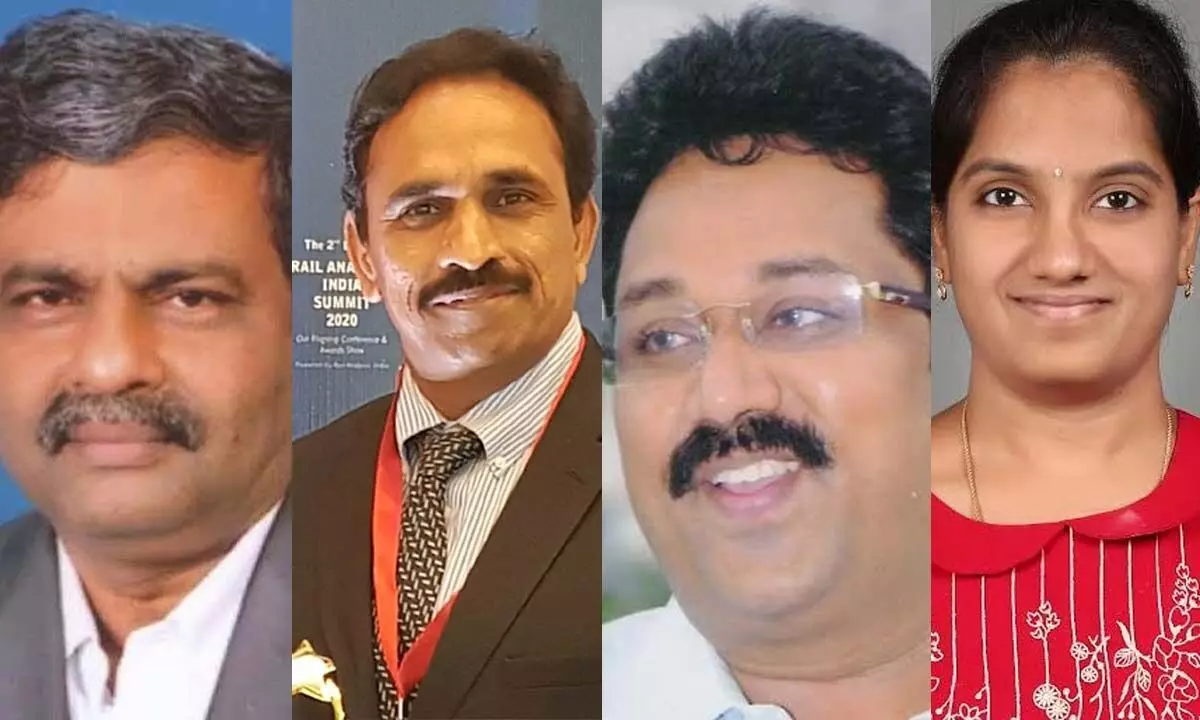Live
- Welfare hostels shut as bills pile up
- CM Revanth Reddy Slams BJP Leaders Over Inaction
- Minister Ponguleti visits Basara temple
- Ashutosh Gowariker to lead International Jury at IFFI 2024
- The global challenges of greener aviation
- Shreyas Media secures exclusive advertising rights for ‘MahaKumbh Mela 2025’
- Experience the journey of art
- Seven iconic ghats undergo makeover for Mahakumbh
- Smog engulfs capital with ‘severe’ air quality
- Slur against HDK wrong, Zameer will be corrected: K’taka Cong
Just In
Visakhapatnam: Saptarishi' budget mantra garners mixed response


Sambasiva Rao, Ravi Eswarapu, Naresh Kumar and Harsha Pravallika
- Finance Minister list seven priorities ‘Saptarishi’ to steer the nation way forward through the ‘Amrit Kaal’
- Appreciating the Budget 2023, president of TiE, AP and CEO of Incubation Centre, Andhra University Ravi Eswarapu referrers to it as pro-start-up
Visakhapatnam: The Budget-2023 presented by Union Finance Minister Nirmala Sitharaman garners response from various sectors as many heave a sigh of relief, including start-up communities, salaried class and individual taxpayers, while a few others express their disappointment. Centred on opportunities for citizens with focus on the youth, growth and job creation along with a strong and stable macroeconomic environment, the Finance Minister listed seven priorities 'Saptarishi' to steer the nation way forward through the 'Amrit Kaal'.
Sharing his opinion, vice-president of National Association of Container Freight Stations and MD of Sravan Shipping Services Private Ltd G Sambasiva Rao mentioned that the budget has given priority for railway infrastructure as well as 50 additional airports improvement and infrastructure connectivity. "Following the capital investment outlay increase to Rs 10 lakh crore, the growth of economy is sure to enhance in future. The government also gave priority to agriculture development, millets and agri-start-ups which is a welcome move," he adds.
Terming the budget as good overall, vice president of Rushikonda Information Technology Park Association (RITPA) and CEO of Symbiosys Technologies O Naresh Kumar says, "Reduction in interest rates on MSME loans is appreciable. MSME units will be eligible for additional Rs 2 lakh crore loans at reduced rates. Also, minimising tax slabs, boosting public infrastructure, spending 10 lakh crore and another 2.4 lakh crore in railways will in turn accelerate economic growth and generate more employment opportunities both in the formal and informal sectors. Besides, focus on bio-fertilisers is a welcome step towards reducing chemicals and providing quality food to people."
Appreciating the Budget 2023, president of TiE, AP and CEO of Incubation Centre, Andhra University Ravi Eswarapu referred to it as pro-start-up. From extension of the date of incorporation for income tax benefits for start-ups from 2023 to 2024 to the benefit of carry forward of losses on change of shareholding of start-ups from seven years of incorporation to 10 years, fund allocated for start-ups to agriculture accelerator fund with a focus on bringing technology to agriculture, new data governance policy to three CoEs for AI and the 100 labs for developing applications using 5G services aim at boosting the tech ecosystem, he reasons.However, the salaried class shares a different version.
Agreeing that the decline in income tax slabs means more disposable income, P Harsha Pravallika, working as a manager (Finance) in an organisation, says, "A rebate under section 87A in the new tax regime from current income level of Rs 5 lakh to Rs 7 lakh is a relief for the beginners who have just started their career. For the salaried class, however, it denies the push for savings and investments or to donate for charitable causes at an individual level. This perhaps is unwelcoming as I have seen several employees who were forced to save for tax benefits eventually helped them during the layoff period.
On the other hand, as a corporate finance employee, the new tax regime means less work for us to verify the investment proofs annually for TDS workings. Apparently, I fear that mobilisation of savings would be tightened."Although, the limit of Rs 3 lakh for tax exemption on leave encashment on separation from employer of non-government salaried employees has been enhanced to Rs 25 lakh in the budget, Harsha Pravallika cautions that those retiring on or before March 31 have a greater tax burden to pay on their encased leaves. Meanwhile, some felt that the standard deduction of Rs 52,500 provided for an individual with income more than Rs 15.5 lakh could be benefitted if it were applicable to those with income of Rs 10 lakh and above.

© 2024 Hyderabad Media House Limited/The Hans India. All rights reserved. Powered by hocalwire.com






